This review and discussion contains spoilers for Star Trek: Picard season 3, episode 2, “Disengage.”
Raffi (Michelle Hurd) is a microcosm of the problems with Star Trek: Picard’s third season.
Raffi is the last survivor of the purge of the show’s original cast at the end of the second and start of the third season. As Picard made room for the returning ensemble from The Next Generation, Raffi has somehow remained part of the show. There is a sense that Picard is somewhat grudgingly giving Raffi focus. After all, her primary role is to gather exposition about the conspiracy against the Federation and to bring Worf (Michael Dorn) into the fold.
On paper, Raffi has the most interesting and compelling plot thread in Picard. It’s the only part of the show that doesn’t feel like a reheated leftover of ideas that either didn’t work the first time around or have been repeated to the point of meaninglessness. Raffi allows Picard to cut away from the events on the Titan, a storyline that is just a jumble of familiar Star Trek clichés thrown together into a stew with little regard for what the end product might taste like.
Within “Disengage,” there is not even the ghost of an original idea — or an original approach to a familiar idea — to be found in the thread focusing on Jean-Luc Picard (Patrick Stewart). Even the basic suggestion that Jack Crusher (Ed Speleers) might secretly be Picard’s son, while also being threatened by an evil alien menace, is lifted directly from “Bloodlines,” an “awful” episode read as “a sign of desperation” in the final season of The Next Generation.
To be fair, there are over 800 episodes of Star Trek. It is inevitable that some will repeat ideas. However, there is something frustrating in how many ideas “Disengage” manages to repeat within its 50-minute runtime. The shots of the Shriek menacing both the Helios and the Titan recall the sequences of the Narada threatening the Kelvin and the Enterprise in J.J. Abrams’ Star Trek. There are even shades of Nero (Eric Bana) in how “Disengage” introduces Vadic (Amanda Plummer).
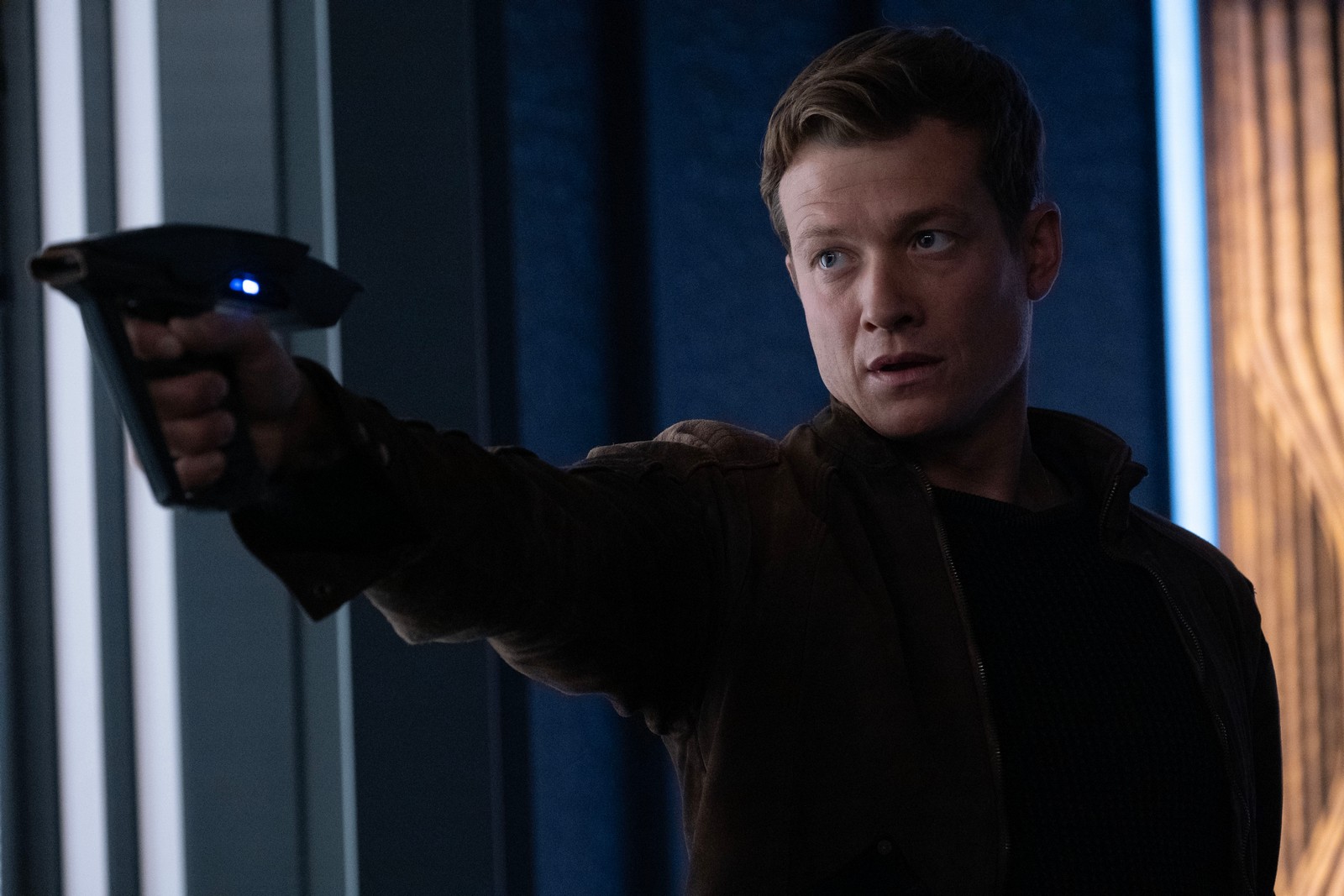
“Good afternoon,” Vadic greets the crew of the Titan. “I believe it is afternoon in Sol System.” That informality is very much at odds with how ship-to-ship negotiations play out on Star Trek, and it recalls Nero’s casual conversations with Captain Christopher Pike (Bruce Greenwood). When Captain Liam Shaw (Todd Stashwick) sarcastically replies that he had been enjoying a lovely morning, Vadic replies, “That’s lovely to hear, Liam.” Again, the use of the first name recalls Nero’s casual, “Hi, Christopher.”
Of course, Vadic is not really defined as a character, but more a collection of familiar tropes and iconography. The bridge of the Shriek looks quite like the classic bridge of a Klingon Bird of Prey, complete with swiveling chair. The sequences of Plummer cackling wildly in the chair while ordering her subordinates to pursue the Titan obviously evoke the performance of her father, Christopher Plummer, as General Chang in Star Trek VI: The Undiscovered Country.
As suggested by the decision to open the season with quotes from Picard’s log entries from the episode, “The Best of Both Worlds” remains a touchstone for Star Trek: Picard season 3, with a mysterious alien entity menacing an individual Federation ship and demanding the surrender of one individual on it. In “The Best of Both Worlds,” the Borg demand Picard. In “Disengage,” Vadic demands Jack Crusher.
There are other plot and narrative elements lifted from “The Best of Both Worlds.” The episode takes place in the calm before a storm, as Vadic gives the Titan an hour to surrender Crusher. It recalls Picard’s embrace of the tradition of “touring the ship before a battle” in “The Best of Both Worlds.” “Disengage” ends with the Titan retreating into a nebula to evade the Shriek, recalling both Star Trek II: The Wrath of Khan and “The Best of Both Worlds.”
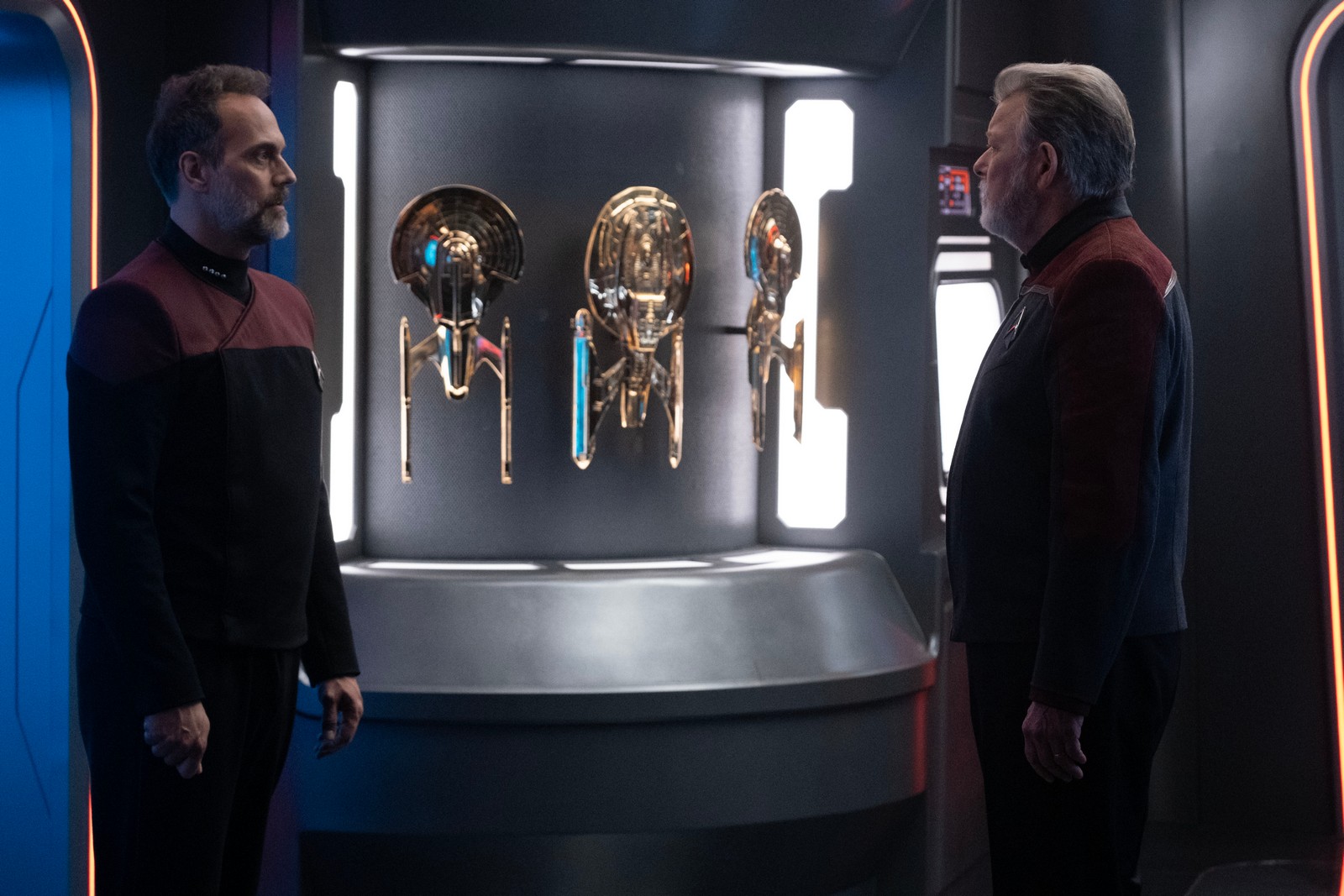
As in “The Next Generation,” the episode’s soundtrack leans heavily on nostalgia. There are faint echoes of Jerry Goldsmith’s classic Klingon score as the camera lingers on the Shriek, and the actual track itself plays when Worf turns up. As Picard and Riker try to deal with the hostile threat staring down at them, the soundtrack shifts to recall Ron Jones’ work on The Next Generation, including his wonderful work on “The Best of Both Worlds.”
Not all of these retread elements are classical. It seems that the current wave of Star Trek has been around long enough to start recycling its own tropes. There’s a lot of “The Vulcan Hello,” the first episode of Star Trek: Discovery and the first episode of this new era, to be found in “Disengage.” Indeed, it seems like the Titan sets are adapted from the Shenzhou sets on Discovery, most obviously in the placing of the ready room off the back of the bridge.
Much like “The Vulcan Hello” (and Picard’s second season premiere, “The Star Gazer”), “Disengage” is built around a standoff with a hostile alien ship at the edge of Federation space. In “The Vulcan Hello,” Captain Philippa Georgiou (Michelle Yeoh) faces an attempted mutiny from her second-in-command, Commander Michael Burnham (Sonequa Martin-Green). In “Disengage,” Captain Liam Shaw is dealing with the fallout of insubordination from his second-in-command, Seven of Nine (Jeri Ryan).
There is something inherently unsatisfying in a discussion of an episode of television that largely consists of identifying the sources of its constituent elements — other episodes that did the same thing before, and often better. It gets at the hollowness of the Titan plot thread in Picard. This isn’t boldly going anywhere new. It’s just serving up a stew of things that the audience has seen before and to no greater purpose. It’s vacuous, empty, and meaningless.
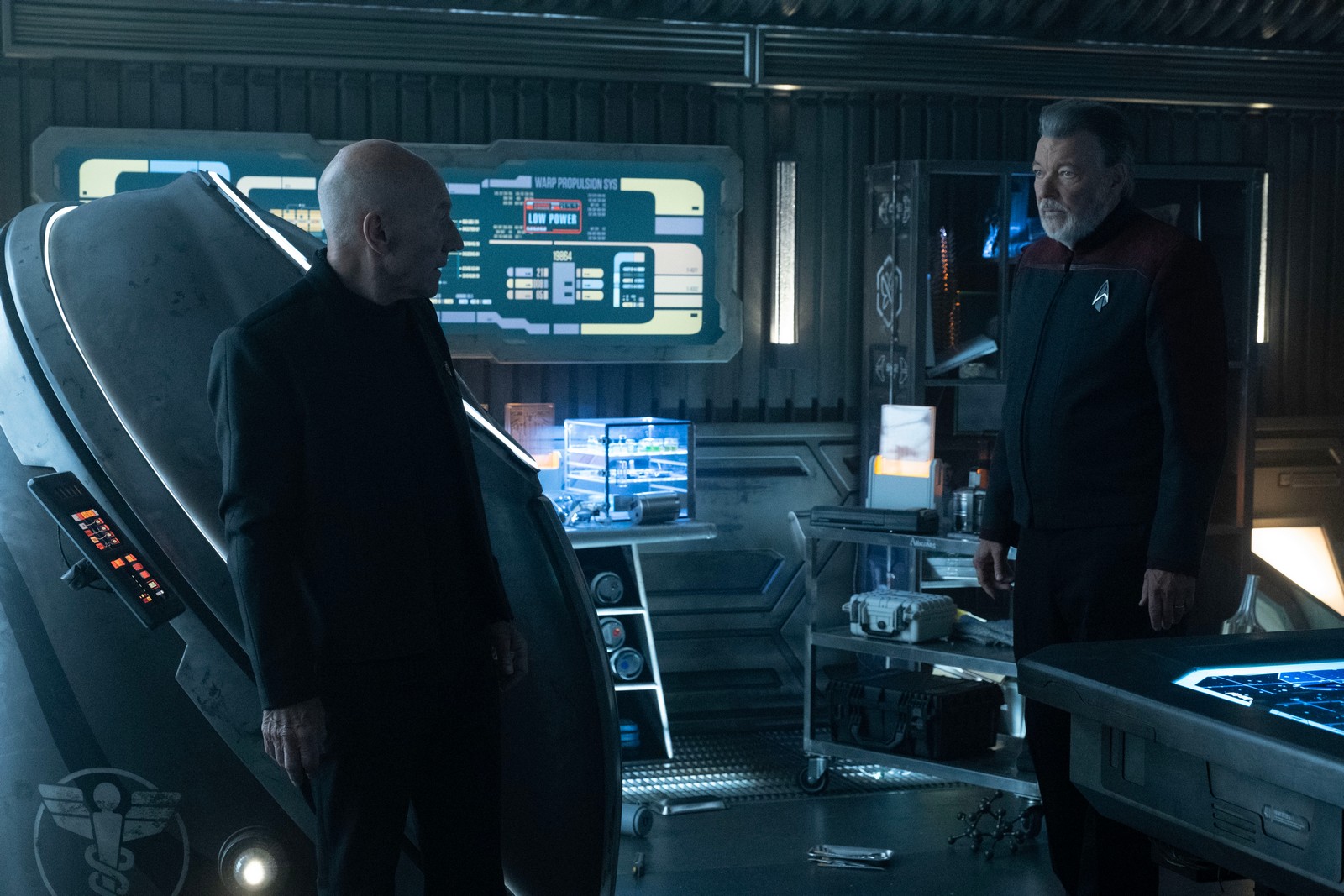
As such, Raffi’s plot thread is better by default. It is at least attempting something interesting and relatively new in the context of the Star Trek franchise. In both “The Next Generation” and “Disengage,” Raffi works undercover to infiltrate the shadier side of the Star Trek universe. This is hardly an original idea, but it is at least an idea that has room for some development or exploration. It gives Picard the chance to go where no Star Trek has gone before.
The closest that a Star Trek episode has come to exploring the idea of working undercover in the criminal underworld in “Honor Among Thieves,” a sixth season episode of Star Trek: Deep Space Nine that saw Chief Miles O’Brien (Colm Meaney) infiltrating the Orion Syndicate. This feels appropriate, given that Picard showrunner Terry Matalas has promised that the season will allow Deep Space Nine fans “to feel seen.” It’s unlikely he meant in this way, but it’s an interesting thought.
The sixth season of Deep Space Nine pushed Star Trek to its limits within the confines of 1990s syndicated television. It succeeded with episodes like “Far Beyond the Stars,” “Inquisition,” and “In the Pale Moonlight.” It also hit boundaries. An episode like “Wrongs Darker Than Death or Night” could never hope to actually depict the experiences of “comfort women” to network standards. “Change of Heart” couldn’t follow through on its premise and kill a regular character mid-season.
Raffi’s story can understandably go further than “Honor Among Thieves.” It has the potential to commit to the premise in a way that simply wasn’t possible in February 1998. What does that look like? How does a version of Star Trek engaging with that concept play out? It’s a fun hook, and Picard seems to at least understand this. After all, the title of “Disengage” doesn’t come from the Titan story thread, but instead comes from Worf’s command to Raffi.
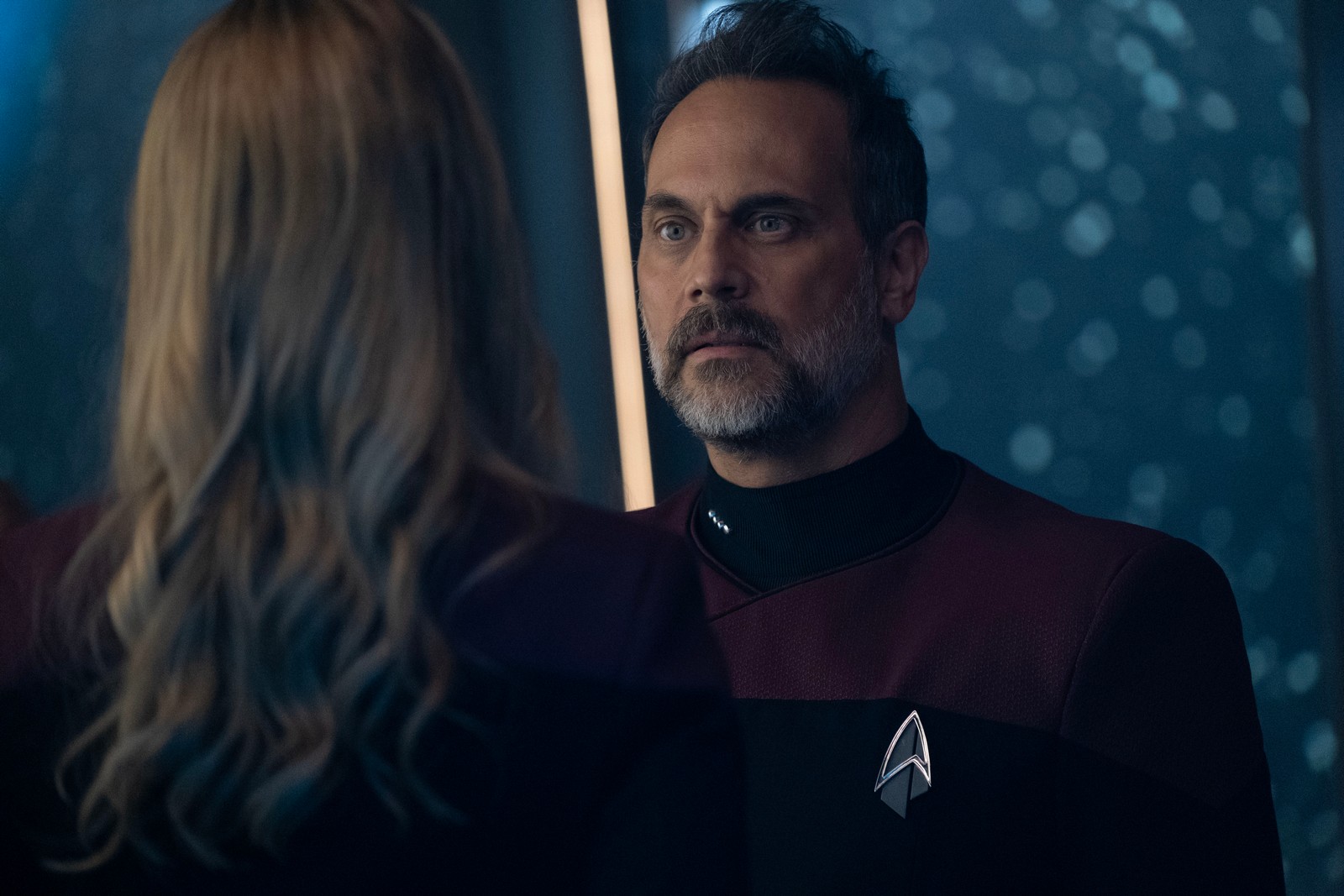
There is also some good character meat here. Raffi is a recovering addict with insubordination issues who has thrown herself into her work at the cost of her family. That’s an interesting character within the larger Star Trek franchise, something closer to an archetype from a police drama like Sonny Crockett (Colin Farrell) from Miami Vice or Rust Cohle (Matthew McConaughey) from True Detective. That’s a character that Picard could build a show around, if it wanted to.
The problem is that Picard doesn’t want to. It’s clear that it has no actual interest in Raffi as a character, despite Hurd’s compelling performance and the character’s unique perspective. So all that neat tension plays out in a single scene of exposition with her ex-husband Jae (Randy J. Goodwin), who conveniently happens to be operating the bar that she needs to get access to in order to further her investigation. None of this is set up, and so none of the drama feels earned.
“Gabe says you ambushed him at his baby’s doctor?” Jae challenges Raffi, a moment that would work much better if it had been seen (or even referenced) before. Jae then conveniently exposits both his and Raffi’s character arcs. “I made a choice,” he tells his ex-wife. “We had this… this beautiful boy. So I chose. I chose my son, my heart. And that was enough for me. But not for you. Gabe pushes you away because he remembers that.” Again, it would be interesting to show this.
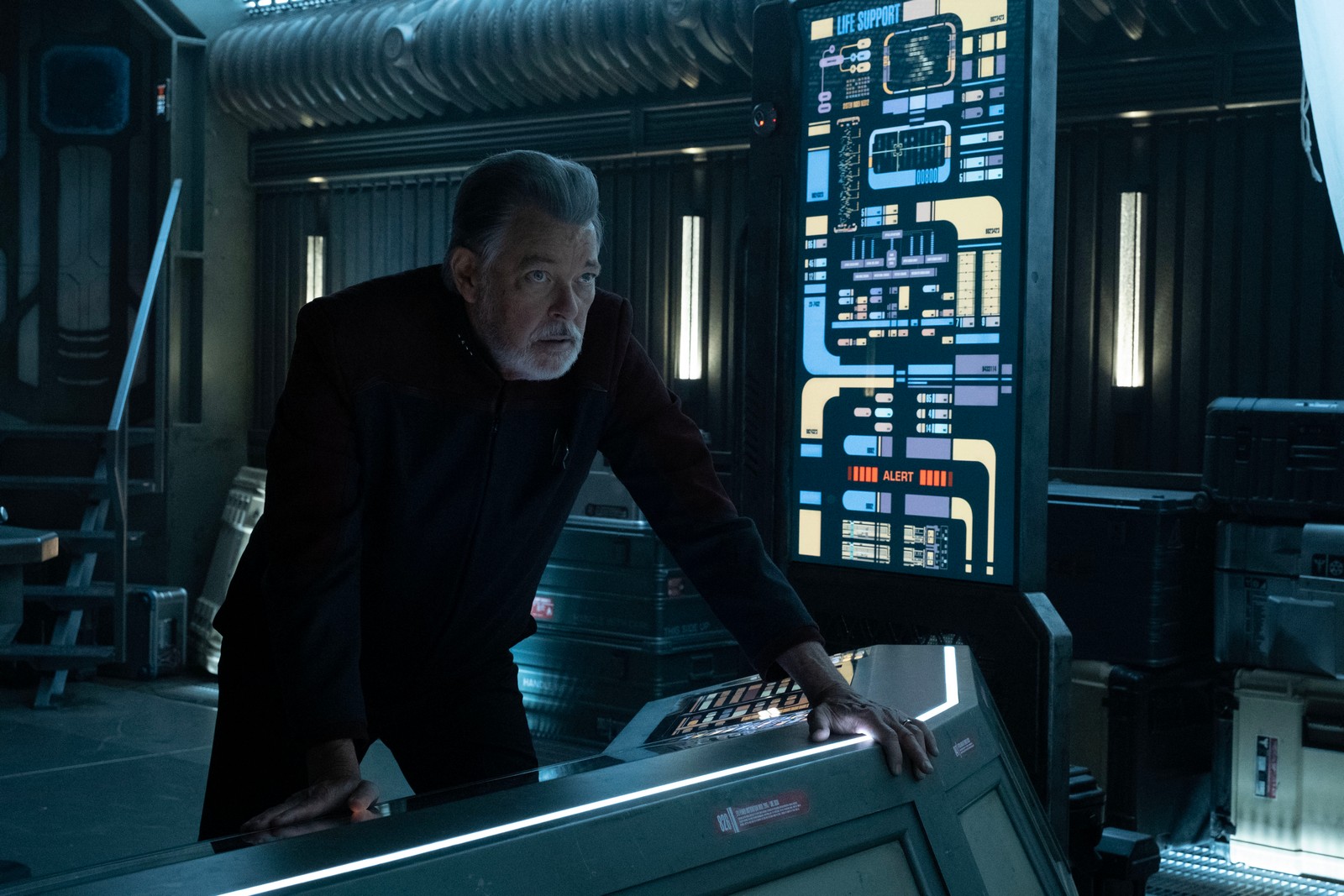
Jae then sets up a dilemma that, on paper, has real emotional stakes. “I could talk to Gabe or I’ll talk to Sneed,” he tells Raffi. “But I will not do both. Right here, right now, make a choice.” This could be a great character moment, if it were paying off something that had been meaningfully established and set up. Instead, it feels more like a plot beat on a card pinned to a whiteboard than an actual piece of character or story work.
Of course, Star Trek: Picard has always existed as a simulacrum of prestige television, most obviously in episodes like “Monsters.” Indeed, there is a sense that the marital difficulties implied between William Riker (Jonathan Frakes) and Deanna Troi (Marina Sirtis) in “The Next Generation” fall into these same gaps — clumsily telling rather than showing. Still, Raffi’s plot would be much more compelling if Picard could bring itself to cut a scene or two of fan service, nostalgia, and Star Trek reheats on the Titan to give Raffi’s arc room to breathe.
Instead, Raffi’s plot pays off another monologue about nostalgia from the Ferengi crime lord Sneed (Aaron Stanford). “I like human things,” he tells Raffi, in a monologue that serves as a companion to Laris’ (Orla Brady) justification of nostalgia in “The Next Generation.” “Retro things. It’s like pressure and coal. Let something get old long enough, eventually it becomes vintage. And of value.” It’s clearly a philosophy with which Star Trek: Picard agrees, considering how much of the show is just retreads.
It’s a shame the series has no interest in creating something that might be “of value” without the coating of nostalgia.

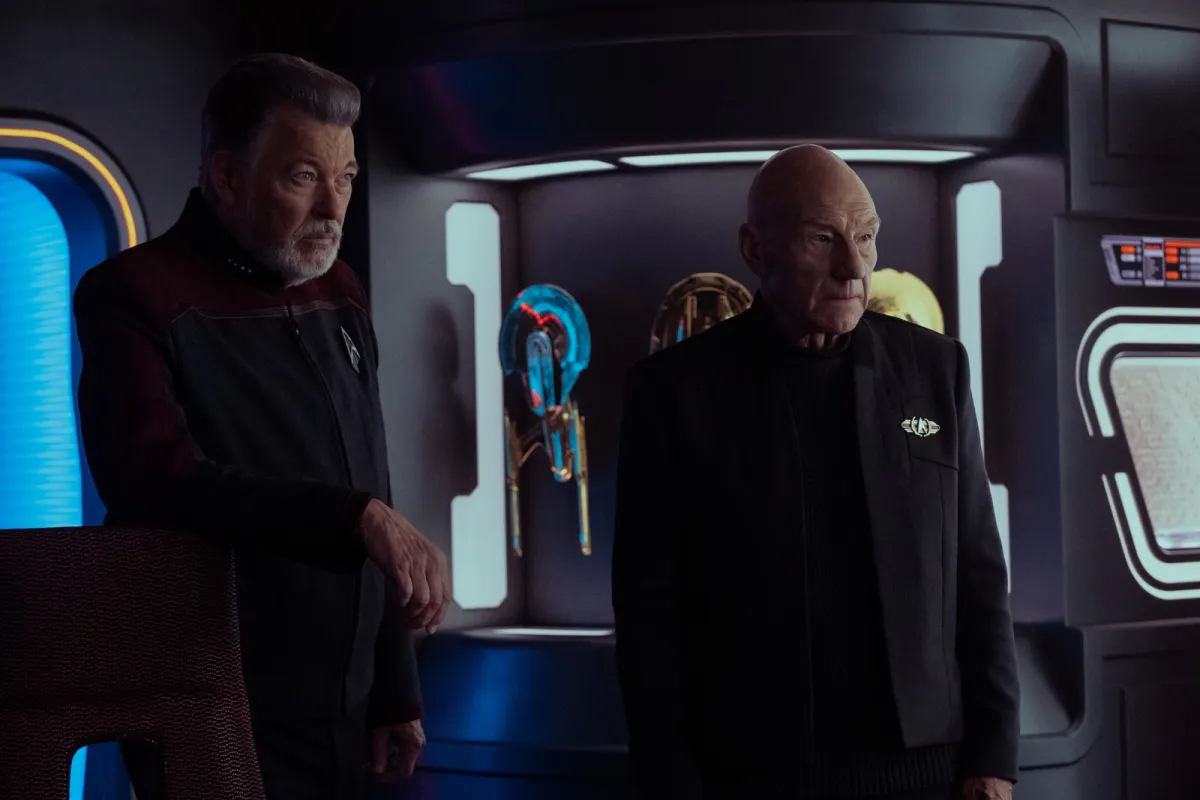


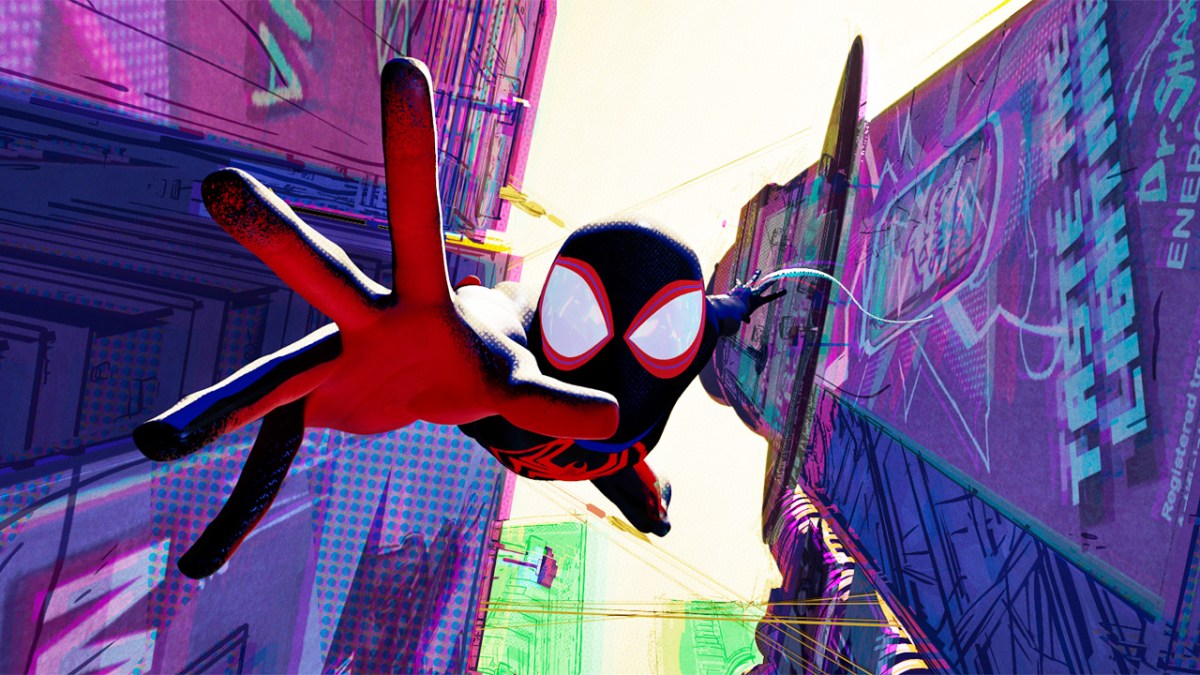

Published: Feb 23, 2023 10:00 am